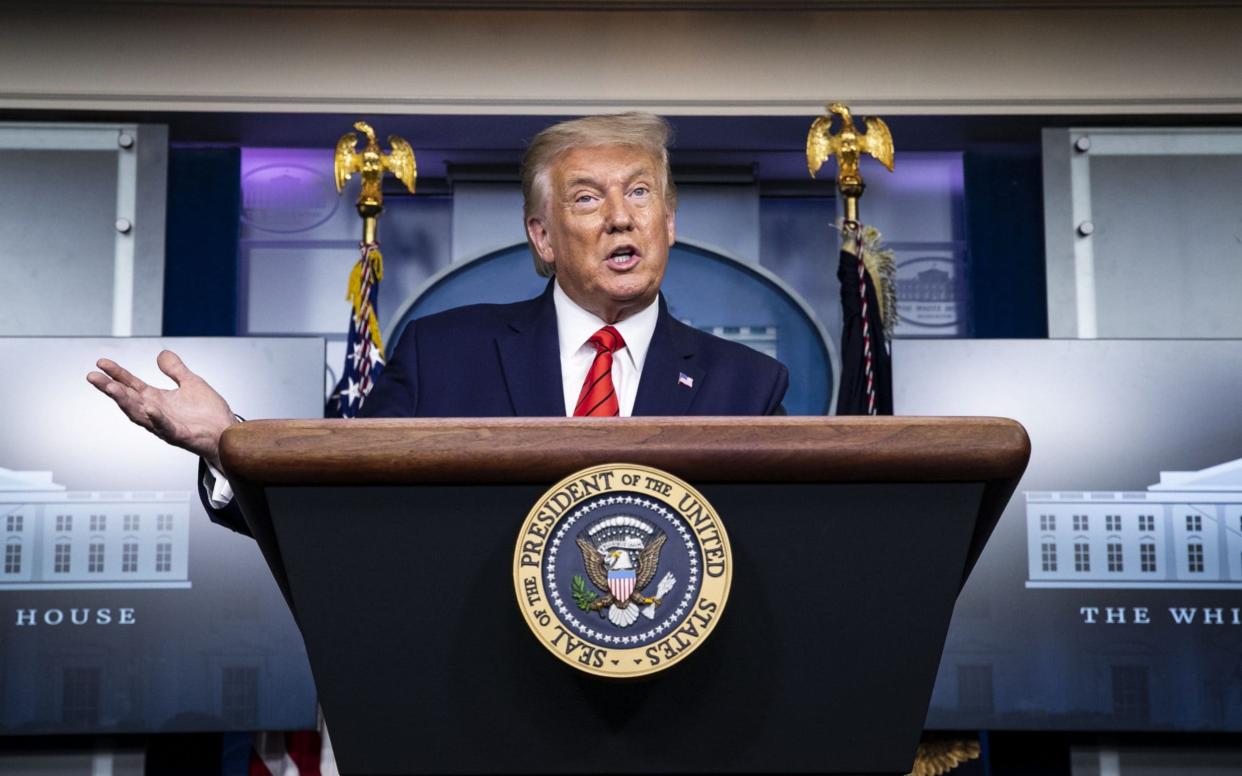What Donald Trump's refusal to condemn Kyle Rittenhouse reveals about his election strategy

Donald Trump will have known that the Kyle Rittenhouse case was likely to come up when he scheduled a White House briefing on Monday afternoon and went hard on his presidential rival Joe Biden’s stance on law and order.
The story of a 17-year-old who went onto the streets of Kenosha, Wisconsin, to keep the peace but ended up accused of killing two protesters and injuring a third has dominated the US headlines since it happened last week.
Which makes the US president’s response when asked if he condemned the actions of Mr Rittenhouse and other vigilantes all the more telling - he declined to say yes, instead mounting a defence for the accused’s behaviour.
The remarks reflect not just the fractured debate about anti-racism protests and episodes of violence seen this year in America but also how, with two months to go, Mr Trump sees a message that could help win him re-election.
Firstly, the complexities of the incident must be untangled. Numerous pieces of footage have surfaced which show snippets of what happened that night, videos which are sure to form a central part of the court battle to come.
In one, Mr Rittenhouse is running, apparently being chased, before turning and shooting. In another he trips and is kicked and hit by a skateboard when down, after which he shoots multiple times again.
The videos have led some on Right to argue that Mr Rittenhouse was acting in self-defence, a message Mr Trump echoed as he outlined his own view on the case from the White House briefing room podium.
“You saw the same tape as I saw and he was trying to get away from them, I guess, looks like. And he fell and then they very violently attacked him,” the president said. He added later “he probably would have been killed”.
He did not voice a message others have delivered - that a 17-year-old boy should never have gone out onto the streets with a rifle to try to police the situation himself.
Mr Biden was among those who criticised the president's remarks. But to fully understand the stance, the wider picture must be viewed.
The country has seen a huge anti-racism protest movement erupt after the shocking death of George Floyd, a black man who died after a white officer pinned him to the ground with a knee on his neck.
The protest spread from Minneapolis, Mr Floyd's hometown, in May to cities across the country and then worldwide. The movement is multifaceted. The majority of demonstrations have been peaceful. But in places they have resulted in violence, rioting and looting.
In even fewer places, there have been long-running clashes between some demonstrators and law enforcement, such as in Portland, Oregon, where for three months there have been regular scenes of violence.
Mr Trump has firmly sided with law enforcement, framing Mr Biden as too weak on rioters and looters and himself as the only man who can keep America’s streets safe - a message undermined by the fact the current violence is happening on his watch.
He has done so by pushing two slogans synonymous with former US president Richard Nixon - “law and order” and “silent majority”.
Mr Nixon won the US election in 1968, the year which saw the assassination of civil rights leader Martin Luther King - triggering widespread race riots - and Democrat presidential hopeful Robert F Kennedy, by vowing “law and order”.
Mr Trump is trying the same playbook. He hopes that with scenes of violence playing out in US cities - “Democrat-run cities” as the president now refers to them on account of their mayors - the voters will back the candidate seen as best placed to end it.
By declining to criticise Mr Rittenhouse, who reportedly attended at least one Trump rally, and other militiamen taking to the streets during anti-racism protests the US president is - however controversially - seen to be standing against the rioters.
Mr Biden has accused the president of expediency, saying he “looks at this violence and sees a political lifeline”. Mr Trump still trails in the polls, given coronavirus and the recession, though the gap is narrowing. Could a focus on riots change the president's fortunes?
Something Mr Biden did on Monday suggests so. He came out hard against the rioters, decrying their "lawlessness" and calling for prosecutions. It was a tacit acknowledgement that the president's law and order rhetoric was cutting through.

